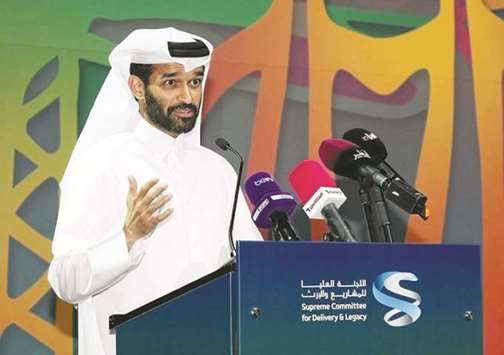
Khalifa Stadium
Covering the period from January 2016 – February 2017, the report highlights areas in which the SC has made progress with regards to workers’ welfare, discusses the challenges faced and how these are being overcome, and sets out the key upcoming priorities for the SC’s dedicated Workers’ Welfare Division (WWD).
“Workers’ welfare is of critical importance to the work of the SC,” said Secretary General Hassan al-Thawadi. “It has the potential to create a transformative and truly global social legacy for the first FIFA World Cup to be held in the Middle East.”
“Today, we have around 13,000 workers on eight construction sites, with a total of 53mn man-hours worked,” added al-Thawadi. “This has inevitably led to an expanded role for our Workers’ Welfare Division, which has widened its focus from improving accommodation standards to covering areas of site welfare, ethical recruitment, stakeholder engagement and workers’ outreach.
“This expanded scope was delivered while the team carried out 2,200 hours auditing ethical recruitment issues, 1,400 hours inspecting accommodations and over 1,000 hours inspecting construction sites, blacklisting three contractors and demobilising nine over workers’ welfare abuses.”
The latest Progress Report discusses a number of milestones the WWD reached during the period covered, including:
* Appointment of Verité for advisory services and ethical recruitment audit training;
* Appointment of Impactt Ltd. as independent third-party monitor;
* Memorandum of Understanding signing between SC and the Building and Woodworkers’ International (BWI) trade union;
* Launch of a dedicated Workers’ Grievance Hotline;
* Launch of an enhanced WWD IT Audit Platform; and
* Publication of the Second Edition of the Workers’ Welfare Standards (WWS).
The report also discusses a number of initiatives that the WWD is progressing, such as the cooling technology deployed to workers during the summer months, the grievance hotline allowing workers to anonymously raise issues, and a partnership with Weill Cornell Medicine designed to monitor workers’ nutritional intake and identify prevalent health issues, such as hypertension and diabetes.
A number of instances in which the WWD are having an impact beyond direct SC projects are also highlighted, including Tanareefa Trading & Contracting, for example, which continued to facilitate SC and Impactt Ltd inspections despite demobilisation in December 2016 following completion of their scope of work.
Ahead of the report’s publication, Khalid al-Kubaisi, chief of the SC’s Advisory Unit which oversees Workers’ Welfare, added: “We have made considerable strides forward in our protection of workers’ rights over the last 12 months and I am proud of the team’s efforts because they are making our bid promise of leaving a lasting positive social legacy a reality.
“However, there is still work to be done to ensure our Workers’ Welfare Standards continue to have a tangible impact on the ground and we are comprehensive in our attempts to tackle the myriad of issues facing migrant workers across the SC programme.”

